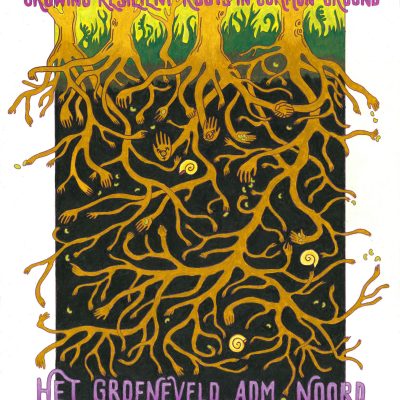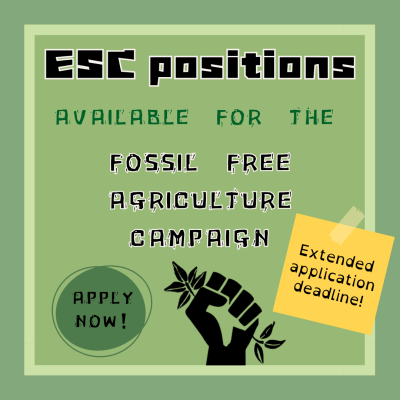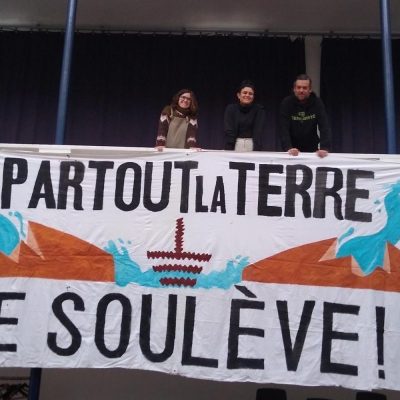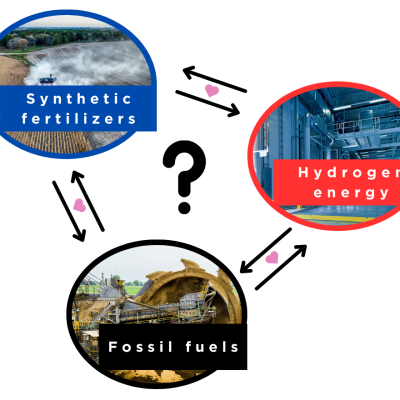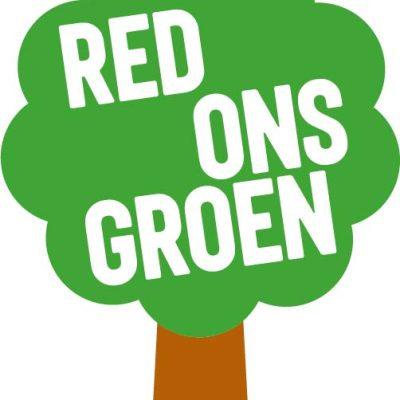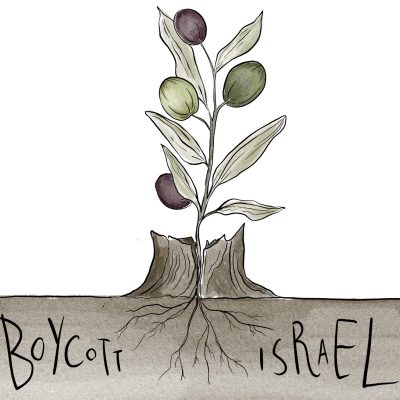September 9, Plantagedok – Amsterdam.
After a summer full of researching, strategising, action camps and drafting a brochure it is about time to share our plans for a campaign on climate change and agriculture with more people. In April we already discussed the topic with some people at a first Cooking the Planet meeting and now we want to invite you for the ‘Cooking the Planet, reheated’ meeting. During this meeting we will present and discuss our campaign plans. Also hopefully some other participants will bring in some proposals for actions and other activities as well. Come to this meeting if you want to hear more about our plans for the coming year. We hope to discuss this together with as many people as possible. For now just a few words to get you interested: public climate meals and civil disobedience against the livestock industry.
We organise the event together with Taste Before You Waste. This collective is focusing on the prevention of food waste. Their aim is to raise awareness about the enormous amount of good food that is thrown away every day and to inform people about what one can do to prevent this from happening. Since recently the Plantagedok is their home base. Obviously they will make a good climate very climate friendly meal from leftovers to start the evening with.
Practicalities:
When: Friday, 9th September. Door open at 18:00 | Food served at 18:30 | Discussion starts at 19:30
Where: Plantage Doklaan 8-12 (See the map)
Contact info: climate@aseed.net
If you are interested in coming please reply or send a confirmation email to the above address, this will help us to estimate how much food we will need to prepare. Thank you!
If you are not able to join on September 9th but you are interested in joining our campaign on climate change and agriculture, don’t hesitate to contact us at any other moment.
The sheets of the presentation given during the first Cooking the Planet about the relation between climate change and agriculture are online: https://aseed.net/pdfs/sheets-presentatie-MKZ16april.pdf
A general report of the first Cooking the Planet you can find below on this page.
Greetings from ASEED’s Agriculture Climate team!
Cooking the Planet Report
On April 16th 2016, the first of a series of meeting concerned with the impact our food systems are having on climate change was organised by ASEED at the MKZ in Amsterdam.
Present on the day were members of various groups and organisations, including: ASEED; GRAIN; Milieudefensie; Global Forest Coalition; Livestock Campaign; Platform Aarde Boer Consument; Toekomstboeren; the off-grid restaurant Kaskantine; as well as an assortment of individuals who were not directly affiliated with a particular group but who are interested in the topic.
The day began with a screening of the documentary ‘Cowspiracy’ followed by a presentation set on exposing the links between climate change and our food systems. After the presentation, the group brainstormed solutions in relation to combatting climate change in terms of changing our food systems.
Key questions that were most prevalent throughout the first meeting were: what are the solutions; what are the desired results; which structures and channels should we use to create this wanted change (politics/lobbying/action/pressure/showing alternatives etc.); how will we reach people; how will we popularise the topic?
Emerging from brainstorming sessions, a list of diverse ideas relating to combatting climate change by way of our food systems were mentioned by the participants. These ideas included: CO2 taxing; demanding that corporations take a step back; promotion of urban farming, circular farming and local oriented agriculture; reduce consumption of meat and dairy; inform consumers via alternative forms of food packaging; warning stickers on meat (negative labels work better than positive labels); reduce production and export; offer alternatives; plant trees on farms (agroforestry); compensate the care given to nature and good farmland; strive for a self-sufficient Europe; change trade rules and supply management and use subsidies in a better way; create an eco-tax on meat and fossil fuels etc.; change things both a consumer and a political level; create better alternatives for a good price; promote eating less meat (insects as an alternative to meat);consider meat eating as a moral problem; take footprints (i.e. carbon footprints and land use footprints) into account in order to portray a clear and honest message; change the message during the campaign every few years, each time going a step further; create new terminology, such as climate farming; support the advancement and continuation of traditional farming as well as giving support to new and alternative methods of farming.
From this brainstorming session, all ideas were split into two categories: government/policy or consumers. From here, the group split into smaller subgroups to allow for the creation of more concrete proposals. The four subgroups were tasked with realising change through either: 1) policy, 2) consumers, 3) alternatives and 4) corporations.
1) Policy
This working group was concerned with realising change through creating policy that allows us to be self-sufficient in terms of food, feed, timber etc. within the EU. Their solutions to achieving this were to: give farmers fairer prices for sustainable products; increase standards for farmers; increase import taxes in the EU; establish eco taxes on fossil fuels/pollution/meat and to decrease tax on labour; supply management; address market power in the food chain; create more efficient EU subsidies; create storage for organic matter; decentralise sustainable energy; and promote agroecology and the likes. The manner through which this can be achieved is through: removing perverse subsidies; stopping TTIP/CETA; creating an alliance with trade unions, farmers, sme’s, NGO’s and social movements; lobbying politicians; create alliances in the global south, also on trade issues.
2) Consumers
This working group was concerned with realising change through changing consumer behaviour. Their solutions to achieving this were to bring awareness about the amount of meat consumed to the average person through: new packaging for meat outlining the facts such as the amount of water used for the production of 1kg of meat (i.e. 1kg of meat = 30 showers); promote eating less meat through advertising; Make eating less meat trendy whilst also giving facts relating to the negative impact meat production and consumption has on climate change; explain that it is better for personal health (and the wellbeing of everybody) to eat less meat (it is in the consumers own interest to cut down); research influential celebrities who are vegetarian – make this fact about them known to the public; doctors and teachers should be obliged to promote eating less meat as well as explaining the negative impact meat consumption has on an individual’s health as well as the negative impact meat production has on climate change; education – programme in schools relating to healthy eating/how to eat healthy; flyers/Youtube video/Facebook to promote eating less meat/to portray the negative impact meat production has on climate change/to portray the negative impact meat consumption has on health; Create a way to reach people who are stuck in habits.
3) Alternatives
This working group was concerned with realising change through creating viable alternatives. Their solutions to achieving this are through: local campaigns and bringing attention to local problems such as soil, collecting organic matter, highlighting green waste; breaking down the boundary between producers and consumers; promotion of DIY methods; placing 9% of ‘green waste’ into local soils; promote experimentation with how to produce your own food; food waste solutions should reflect climate smart production; Sharing problems in terms of soil/landscape/food security on a local level; breaking the dichotomy between production and consumption by acting locally – geographic shared responsibility, sharing problems locally, getting rid of producer vs consumer dichotomy – everyone should then feel responsible, creating a C in the soil – environmental shepherd/landscape caretaker. This group also suggestion creating a competition whereby citizens can register as a team to bring as much compost to farms in return for farm products. This creates a shared responsibility.
4) Corporations
This working group was concerned with realising change through influencing the behaviour of corporations. Their solutions to achieving this are through: hitting their investments; full cost pricing (but that is more for the policy group because companies will not do this by themselves); portray them as being a risk to investors; damage their image/counter their greenwashing attempts; create a court case against them as it creates a lot of negative publicity for free; direct actions and sabotage (this only works if it is linked to a broader campaign and has support from civil society and it often takes quite some time before the effects are visible). This group also concluded that we should localise our society. There should be more local and regional productions and shorter lines between producers and consumers. This will make it easier for people to see the effects of their behaviour and it will also make it easier to take other criteria into account besides the price of a product.

